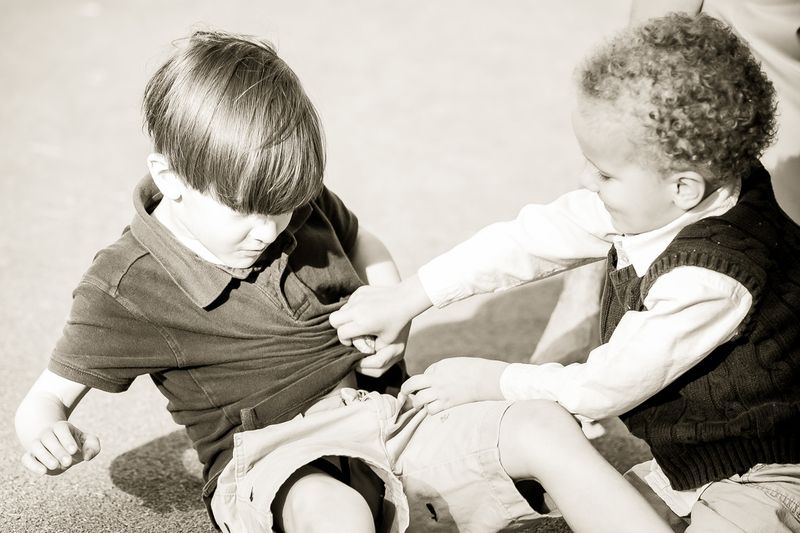Being the firstborn often means navigating uncharted territory within the family. Parents are typically more cautious and experimental with their first child, leading to unique challenges and expectations. Firstborns often shoulder more responsibilities, act as role models for their younger siblings, and receive stricter discipline.
This dynamic shapes their personality and life experiences in ways only they can truly grasp. From managing parental expectations to balancing sibling relationships, firstborns encounter a myriad of everyday struggles that are both relatable and specific to their role within the family unit.
1. Parental Expectations

Firstborns often carry the weight of high parental expectations. Their parents might expect them to excel in academics, sports, or other activities, setting a benchmark for younger siblings. This pressure can lead to stress and anxiety. Some firstborns may thrive under this pressure, using it as motivation. However, for others, it can be overwhelming. Managing these expectations involves constant negotiation and communication with parents. Firstborns often learn to be resilient and develop strong problem-solving skills. It’s crucial for them to find a balance between meeting expectations and pursuing personal passions.
2. Role Model Pressure

Being the eldest means being a role model for younger siblings. The firstborn often feels the pressure to behave perfectly, as their actions are closely watched and often imitated. This can be rewarding, but also exhausting. They serve as a guide for siblings, navigating life’s challenges first. Firstborns learn to embrace responsibility early, which can enhance their leadership skills. Yet, the need to always be ‘perfect’ can be challenging. They must balance maintaining their image with being authentic. Embracing imperfections can be a valuable lesson for both them and their siblings.
3. Stricter Discipline

Firstborns often experience stricter discipline compared to their siblings. Parents are usually more cautious with their first child, setting rigorous rules and boundaries. This can lead to feelings of unfairness, especially when younger siblings are given more leniency. However, it instills a strong sense of discipline and responsibility. Over time, firstborns may come to appreciate the structure it provides, despite the initial resistance. They learn to navigate rules with diplomacy and develop negotiation skills. Understanding parents’ perspectives and discussing boundaries can foster mutual respect and understanding.
4. High Responsibility

From a young age, firstborns often take on significant responsibilities, such as babysitting siblings or helping with household chores. This fosters maturity and independence. While it can be rewarding, it may also feel burdensome. Balancing personal interests with family duties is a constant challenge. Firstborns learn to manage their time efficiently and prioritize tasks. They often become natural leaders, capable of handling multiple responsibilities simultaneously. Encouraging open communication within the family helps distribute responsibilities more equitably. Recognizing their efforts and achievements builds confidence and reinforces positive behavior.
5. Lack of Parental Experience

Firstborns are often raised by parents who are still learning the ropes of parenting. This can lead to inconsistencies in rules and expectations as parents try to find their footing. Firstborns might experience more trial-and-error situations than their siblings. This dynamic can foster adaptability and patience. Over time, firstborns learn to handle unpredictable scenarios and become more resilient. They often help teach parents what works and what doesn’t. Embracing this learning process can strengthen family bonds. Firstborns grow with their parents, sharing a unique journey of mutual growth and understanding.
6. Breaking New Ground

Firstborns often venture into new activities and interests, setting the precedent for their siblings. They are the first to explore new hobbies, face different challenges, and establish family traditions. This can be exciting and empowering. However, it also comes with uncertainties and the pressure to succeed. Firstborns learn to navigate uncharted territories with initiative and courage. Their pioneering spirit can inspire siblings to pursue their interests. Encouraging exploration and supporting their endeavors fosters creativity and innovation. Celebrating achievements, big or small, enhances their confidence and motivation.
7. Mediator in Sibling Disputes

Firstborns often find themselves mediating conflicts between siblings. This role requires patience, diplomacy, and effective communication skills. They learn to navigate emotions and perspectives, striving to maintain harmony. This can be challenging but rewarding. The experience equips them with valuable conflict-resolution skills applicable in various life situations. Balancing empathy with fairness is key. Encouraging siblings to express their feelings openly can prevent misunderstandings. Firstborns grow adept at fostering positive relationships, both within the family and beyond. Their mediation skills often translate into strong leadership qualities in adulthood.
8. Feeling of Being Overlooked

As the family grows, firstborns might feel overlooked while parents focus on younger siblings. Their achievements may not receive the same level of attention or celebration. This can lead to feelings of neglect or resentment. It’s important for firstborns to communicate their needs and accomplishments clearly. Seeking recognition from parents and celebrating personal milestones helps affirm their value. Building self-confidence independently fosters resilience. Families can support by balancing attention and acknowledging all children’s achievements equally. Encouraging an open dialogue about feelings can strengthen family unity and understanding.
9. Pioneering in Family Traditions

Firstborns often initiate family traditions, setting the framework for future generations. They play a crucial role in creating and maintaining family rituals. This can be fulfilling but also bears the responsibility of ensuring these traditions are meaningful. Firstborns learn to be creative and resourceful, integrating diverse interests. They often act as a bridge between older and younger generations, fostering unity. Encouraging participation from all family members enriches the experience. Recognizing their contributions in shaping traditions enhances their sense of belonging. These experiences establish a legacy that resonates through time.

Well, hello there!
My name is Jennifer. Besides being an orthodontist, I am a mother to 3 playful boys. In this motherhood journey, I can say I will never know everything. That’s why I always strive to read a lot, and that’s why I started writing about all the smithereens I came across so that you can have everything in one place! Enjoy and stay positive; you’ve got this!

